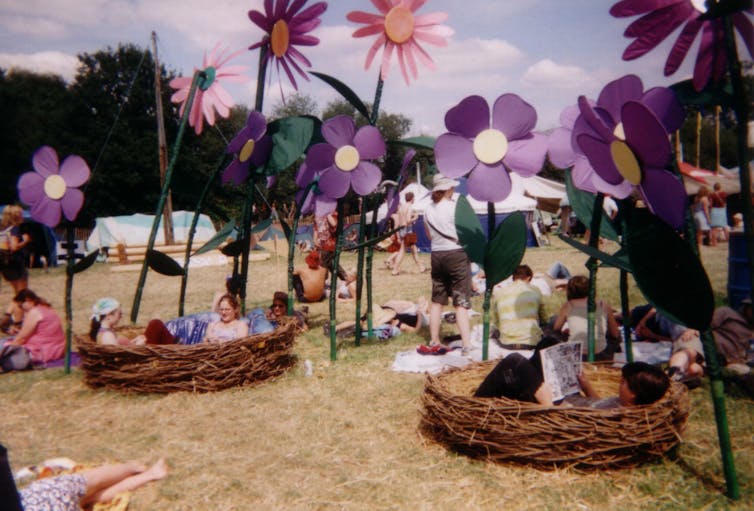Those who travel to Glastonbury this weekend will have forked out £228 (plus a £5 booking fee) per ticket for the privilege, and many will spend just as much once there. Many music festivals today tend to be associated with such significant sums.
The same cannot be said of Woodstock or the Glastonbury of the 1970s and 80s. Woodstock famously came free. The first Glastonbury in 1970 cost £1. By 1989 it had only reached £28. These festivals not only bring to mind images of revelry and era-defining music, but also hold prominent positions in the public’s collective imagination as conveyors of political resistance and social change.
As live music takes on a greater economic significance for the music industry, and the festival scene accordingly explodes, this revolutionary aspect of live music is waning. Powerful images such as Jimi Hendrix protesting American imperialism with a guitar solo have been sanitised. Festivals are now generally imbued with messages of commercial aspiration. It’s safe to say that attending live music events no longer represents the counter-cultural movement it possibly once did.
This hasn’t stopped music consumers from signing up. And nor has it stopped music festivals, both big and small, from positioning themselves as beacons of social responsibility and ethical consumption in the hope of appealing to music fans. But there is evidence to suggest that this may now be putting punters off, not enticing them.
The benefits of positioning your music festival or live event in such a way are obvious in a crowded marketplace (there were 1,070 festivals in the UK last year). There is a sense of authenticity associated with ethical festivals that is perceived to be particularly attractive to consumers of the arts who seek the cultural capital that this can potentially provide. It is standard practice in the contemporary marketing of any product or service to highlight ethical or socially responsible features as a selling point.

Emotive sounds
Moving beyond the marketing, and the cynical viewpoint it inevitably brings, music and the arts are often presumed to be a powerful vehicle in which to advocate social responsibility because of music’s capacity to move us. There is a long history of live music events that seem to be testament to this, from the performances of the famous 19th-century opera singer Jenny Lind, who gave much of her proceeds to charity, to more recent events, such as Band Aid’s campaign to tackle famine and global poverty. Such examples demonstrate the power of live music to raise money and awareness for social issues.
But a question that has been rarely asked, particularly in academic research, is what the music fan/consumer thinks about the use of music events to promote socially responsible causes. Is music as suitable a vehicle for this as is generally presumed?
This is a question that myself and colleagues Todd Green (Brock University) and Julie Tinson (University of Stirling) asked in recent research. Our findings suggest that music fans have inconsistent levels of awareness, interest and support when it comes to socially responsible engagement in the music industry. We conducted 22 qualitative interviews that averaged 54 minutes with festival-goers from multiple cities across the UK and Ireland who represented a diverse population in terms of gender, age, and income level.
While many were able to identify “socially responsible” artists and events such as Bono and Glastonbury, they were unlikely to be able to elaborate in any detail how such artists and events were deemed to be this way, what particular causes they engaged with, or what charities they promoted.
It was also apparent that the participants only focus on socially responsible (or irresponsible) aspects of live music was if it directly impacted their own experience. While the value that comes with associating oneself with a socially responsible event was recognised, in general motivations such as price, quality of the music and convenience of the venue were deemed much more important.

No strings attached
This may not come as a surprise to most music fans, who would prioritise such needs as a matter of self-interest. But what is surprising is the disdain that many of the participants have for the promotion of socially responsible causes. Many saw this as interfering with their leisure time, diminishing their experience of live events. “Don’t be lecturing us on Middle Eastern politics when all we want to do is a have a dance”, was a response we received that was a typical sentiment.
One may argue that the sample used may not have been necessarily engaged in social causes. But this same sample expressed strong concern for the ethical production/consumption of more everyday routine products, that you might find in a supermarket for example. This evidence contradicts the common presumption in previous research that matching a hedonistic product/service with an ethical message is more effective than with a utilitarian one.
Why is this the case? One theory is that the pressure to be ethical and socially engaged is something that is embedded in everyday routines, and increasingly reflected in the everyday purchases that we make. Live music events and particularly festivals are viewed as spaces in which people can escape from such pressures of everyday life.
This raises obvious questions about how events which are positioned in this way are promoted. But more importantly, it raises questions about the role that events such as festivals have in promoting and engaging social causes and whether the “power” of music is shifting as live music becomes more commercially important.

